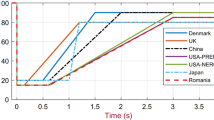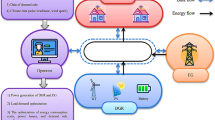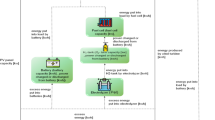Abstract
Electricity generation involves the release of hazardous gases into the environment by fossil-fueled generators. Along with promoting the renewable energy sources, power engineers must come up with a compromise solution that results in reduced harmful gas emissions when electricity is generated economically. The goal of this paper is to structure a balanced trade-off approach for solving the problem of environment constrained economic dispatch (ECED).novel comparison of the proposed ECED method, existing price-penalty-factor (PPF), and fractional programming (FP) methods for solving CEED problems is carried out on a dynamic 3-unit test system to evaluate which technique provides a healthier trade-off solution in terms of cost as well as toxic gases emitted. By combining the greedy JAYA algorithm with an algorithm based on a crow’s food seeking approach, a robust hybrid algorithm is developed that used as the optimization tool. When comparing the suggested ECED technique to the PPF and FP based CEED solutions, the amount of released pollutants and generating cost were considerably nearer to the emission dispatch and economic dispatch respectively. Furthermore, statistical research backs up the suggested hybrid optimizer’s superiority over existing algorithms in the literature.







Similar content being viewed by others
Data availability
Data are available from the corresponding author on reasonable request.
References
Anestis A, Georgios V (2019) Economic benefits of Smart Microgrids with penetration of DER and mCHP units for non-interconnected islands. Renew Energy 142:478–486
Askarzadeh A (2016) A novel metaheuristic method for solving constrained engineering optimization problems: crow search algorithm. Comput Struct 169:1–12
Askarzadeh A (2017) A memory-based genetic algorithm for optimization of power generation in a microgrid. IEEE Trans Sustain Energy 9:1081–1089
Bahmani-Firouzi B, Azizipanah-Abarghooee R (2014) Optimal sizing of battery energy storage for micro-grid operation management using a new improved bat algorithm. Int J Electr Power Energy Syst 56:42–54
Basak S, Bhattacharyya B, Dey B (2022a) Dynamic economic dispatch using hybrid CSAJAYA algorithm considering ramp rates and diverse wind profiles. Intell Syst Appl 16:200116
Basak S, Bhattacharyya B, Dey B (2022b) Combined economic emission dispatch on dynamic systems using hybrid CSA-JAYA Algorithm. Int J Syst Assur Eng Manag 13(5):2269–2290
Basak S, Dey B, Bhattacharyya B (2022c) Uncertainty-based dynamic economic dispatch for diverse load and wind profiles using a novel hybrid algorithm. Environ Dev Sustain 25:1–41
Basu M, Chowdhury A (2013) Cuckoo search algorithm for economic dispatch. Energy 60:99–108
Bhattacharya A, Chattopadhyay PK (2010) Solving complex economic load dispatch problems using biogeography-based optimization. Expert Syst Appl 37:3605–3615
Chen C, Duan S, Cai T, Liu B, Hu G (2011) Smart energy management system for optimal microgrid economic operation. IET Renew Power Gener 5:258–267
Coelho VN, Coelho IM, Coelho BN, Cohen MW, Reis AJ, Silva SM et al (2016) Multi-objective energy storage power dispatching using plug-in vehicles in a smart-microgrid. Renew Energy 89:730–742
Daniel L, Chaturvedi KT, Kolhe ML (2018) Dynamic economic load dispatch using Levenberg Marquardt algorithm. Energy Procedia 144:95–103
Dey B, Bhattacharyya B (2022) Comparison of various electricity market pricing strategies to reduce generation cost of a microgrid system using hybrid WOA-SCA. Evol Intell 15(3):1587–1604
Dey B, Roy SK, Bhattacharyya B (2019) Solving multi-objective economic emission dispatch of a renewable integrated microgrid using latest bio-inspired algorithms. Eng Sci Technol Int J 22:55–66
Dey B, Bhattacharyya B, Márquez FPG (2021a) A hybrid optimization-based approach to solve environment constrained economic dispatch problem on microgrid system. J Clean Prod 307:127196
Dey B, Bhattacharyya B, Devarapalli R (2021b) A novel hybrid algorithm for solving emerging electricity market pricing problem of microgrid. Int J Intell Syst 36(2):919–961
Dey B, Basak S, Pal A (2022) Demand-side management based optimal scheduling of distributed generators for clean and economic operation of a microgrid system. Int J Energy Res 46(7):8817–8837
Dhillon J, Parti S, Kothari D (1993) Stochastic economic emission load dispatch. Electr Power Syst Re 26:179–186
Elattar EE (2018) Modified harmony search algorithm for combined economic emission dispatch of microgrid incorporating renewable sources. Energy 159:496–507
Gazijahani FS, Ravadanegh SN, Salehi J (2018) Stochastic multi-objective model for optimal energy exchange optimization of networked microgrids with presence of renewable generation under risk-based strategies. ISA Trans 73:100–111
Ghasemi A, Enayatzare M (2018) Optimal energy management of a renewable-based isolated microgrid with pumped-storage unit and demand response. Renew Energy 123:460–474
Gholami K, Dehnavi E (2019) A modified particle swarm optimization algorithm for scheduling renewable generation in a micro-grid under load uncertainty. Appl Soft Comput 78:496–514
Goldberg DE, Holland JH (1988) Genetic algorithms and machine learning. Mach Learn 3:95–99. https://doi.org/10.1023/A:1022602019183
Hosseinnezhad V, Babaei E (2013) Economic load dispatch using θ-PSO. Int J Electr Power Energy Syst 49:160–169
Kai S, Qing L, Jizhen L, Yuguang N, Ruifeng S, Yang B (2011) New combination strategy of genetic and tabu algorithm an economic load dispatching case study. In: 2011 Chinese control and decision conference (CCDC. pp. 1991–1995
Karmakar N, Bhattacharyya B (2020) Optimal reactive power planning in power transmission system considering FACTS devices and implementing hybrid optimisation approach. IET Gener Transm Distrib 14(25):6294–6305
Kasaei MJ (2018) Energy and operational management of virtual power plant using imperialist competitive algorithm. Int Trans Electr Energy Syst 28:e2617
Kumar KP, Saravanan B, Swarup K (2016) Optimization of renewable energy sources in a microgrid using artificial fish swarm algorithm. Energy Procedia 90:107–113
Miao Di, Hossain S (2020) Improved gray wolf optimization algorithm for solving placement and sizing of electrical energy storage system in micro-grids. ISA Trans 102:376–387
Moghaddam AA, Seifi A, Niknam T, Pahlavani MRA (2011) Multi-objective operation management of a renewable MG (micro-grid) with back-up micro-turbine/fuel cell/battery hybrid power source. Energy 36:6490–6507
Nwulu NI, Xia X (2017) Optimal dispatch for a microgrid incorporating renewables and demand response. Renew Energy 101:16–28
Rabiee A, Sadeghi M, Aghaei J (2018) Modified imperialist competitive algorithm for environmental constrained energy management of microgrids. J Clean Prod 202:273–292
Ramli MA, Bouchekara H, Alghamdi AS (2019) Efficient energy management in a microgrid with intermittent renewable energy and storage sources. Sustainability 11:3839
Rao R (2016) Jaya: a simple and new optimization algorithm for solving constrained and unconstrained optimization problems. Int J Ind Eng Comput 7:19–34
Sharma S, Bhattacharjee S, Bhattacharya A (2016) Grey wolf optimisation for optimal sizing of battery energy storage device to minimise operation cost of microgrid. IET Gener Transm Distrib 10:625–637
Sharma S, Bhattacharjee S, Bhattacharya A (2018a) Operation cost minimization of a micro-grid using quasi-oppositional swine influenza model based optimization with quarantine. Ain Shams Eng J 9:45–63
Sharma S, Bhattacharjee S, Bhattacharya A (2018b) Probabilistic operation cost minimization of micro-grid. Energy 148:1116–1139
Sihna N (2001) Some studies on application of intelligent techniques to economic operation of power systems. Jadavpur University, Calcutta
Sinha N, Chakrabarti R, Chattopadhyay P (2003) Evolutionary programming techniques for economic load dispatch. IEEE Trans Evol Comput 7:83–94
Trivedi IN, Jangir P, Bhoye M, Jangir N (2018) An economic load dispatch and multiple environmental dispatch problem solution with microgrids using interior search algorithm. Neural Comput Appl 30:2173–2189
Wang C, Shahidehpour S (1994) Ramp-rate limits in unit commitment and economic dispatch incorporating rotor fatigue effect. IEEE Trans Power Syst 9:1539–1545
Yalcinoz T, Short M (1998) Neural networks approach for solving economic dispatch problem with transmission capacity constraints. IEEE Trans Power Syst 13:307–313
Yang X, Leng Z, Xu S, Yang C, Yang L, Liu K et al (2021) Multi-objective optimal scheduling for CCHP microgrids considering peak-load reduction by augmented ε-constraint method. Renew Energy 172:408
Zehra SS, Aqeel Ur R, Armghan H, Ahmad I, Ammara U (2021) Artificial intelligence-based nonlinear control of renewable energies and storage system in a DC microgrid. ISA Trans 121:217
Zheng Y, Jenkins BM, Kornbluth K, Træholt C (2018) Optimization under uncertainty of a biomass-integrated renewable energy microgrid with energy storage. Renew Energy 123:204–217
Funding
The authors declare that no funds, grants, or other support were received during the preparation of this manuscript.
Author information
Authors and Affiliations
Contributions
Conceptualization, methodology and software: BD; validation and formal analysis: SR; visualization and data curation: RB; reviewing, editing & supervision: TC.
Corresponding author
Ethics declarations
Conflict of interest
The authors have no relevant financial or non-financial interests to disclose.
Additional information
Publisher's Note
Springer Nature remains neutral with regard to jurisdictional claims in published maps and institutional affiliations.
Rights and permissions
Springer Nature or its licensor (e.g. a society or other partner) holds exclusive rights to this article under a publishing agreement with the author(s) or other rightsholder(s); author self-archiving of the accepted manuscript version of this article is solely governed by the terms of such publishing agreement and applicable law.
About this article
Cite this article
Dey, B., Raj, S., Babu, R. et al. An approach to attain a balanced trade-off solution for dynamic economic emission dispatch problem on a microgrid system. Int J Syst Assur Eng Manag 14, 1300–1311 (2023). https://doi.org/10.1007/s13198-023-01932-1
Received:
Revised:
Accepted:
Published:
Issue Date:
DOI: https://doi.org/10.1007/s13198-023-01932-1





